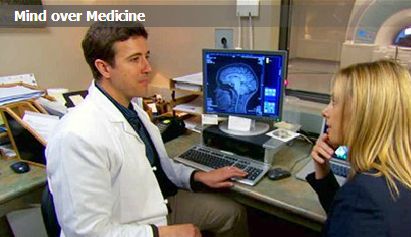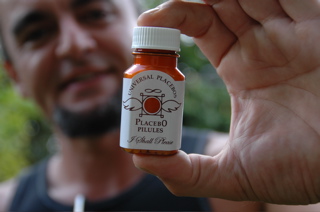Recent research, published in The Lancet, reveals that paracetomol, the ‘recommended first-line analgesic for acute low back pain’, is no more effective than placebo treatment. Put another way, a placebo is just as likely to generate relief as paracetomol. If you don’t want to read the Lancet report (it’s pretty dry!), there’s a brief article here.
Tag Archives: Medicine
Placebo Effect is Great if You are ‘Nice’
‘The effectiveness of placebos now makes it clear that our bodies do not distinguish between a chemical process and the thought of a chemical process.
Also surprising: As many as 80 percent of all doctors say they have prescribed placebos — which include saline (salt water) injections along with familiar “impure” placebos, such as prescribing an antibiotic for a viral illness.
Nicer patients respond best to placebos. In a multi-university study, people with traits like resiliency, straightforwardness and altruism experienced a greater reduction in pain after taking a placebo than did those with an “angry hostility personality trait.”’
Toxic Antidepressants
Following on from the recent post on antidepressants and the placebo effect, we find a website dedicated to sharing information about antidepressant toxicity. It may be that for some people at least, the meds are not only useless but actually harmful. You be the judge! Toxic Antidepressants.
Antibiotics Are Still Overprescribed
We’ve mentioned elsewhere on this site that conventional doctors are quite aware that they’re often prescribing ‘placebos’ – that is, antibiotics for conditions which they know will not respond to antibiotics. Why? It seems, that’s what patients expect, and doctors, under the pressure of pushing as many through the doors per hour as they can, just don’t have the time to explain that medication is just not necessary for something like a viral infection. At least, we hope that this is the explanation. We’d hate to think that the medical professiona was at all involved in helping bolster drug sales …
Here’s an NPR news article about the over-prescription phenomenon. Problem is, the practice is not only unnecessary and expensive, it can be dangerous.
Harvard says placebos are going mainstream
Mind over Medicine

More placebos in the media, this time from Australia’s 60 Minutes.
"We have in our minds, in our brains, the capacity to change the way we experience pain, to affect some of the illnesses that bring us in to see physicians. What we need to do is learn how to unlock those capacities and make use of them."
Stuff they don’t want you to know
From Howstuffworks
"Here’s where it gets crazy … (the incidence of) the placebo effect itself is increasing."
"Approximately half the drugs that fail in late stage trials fail because they simply can’t outperform placebos".
The value of ‘consensual’ placebo effect in treating Irritable Bowel Syndrome
From PLoS ONE
Placebos administered without deception may be an effective treatment for IBS [Irritable Bowel Syndrome]. Further research is warranted in IBS, and perhaps other conditions, to elucidate whether physicians can benefit patients using placebos consistent with informed consent.*
Source the article here.
* Kaptchuk TJ, Friedlander E, Kelley JM, Sanchez MN, Kokkotou E, et al. (2010) Placebos without Deception: A Randomized Controlled Trial in Irritable Bowel Syndrome. PLoS ONE 5(12): e15591. doi:10.1371/journal.pone.0015591
Britain’s NHS should subsidise placebos?
Here’s an article from a blog called PRACTICAL ETHICS (Ethics in the News) at the University of Oxford. It’s pretty unfriendly to homeopathy, which we think isn’t quite as cut and dried a domain of practice as the author, Bennett Foddy, assumes. Brian, one of our founders, is happy to advise on both homeopathic and placebo regimes. That’s one point where we differ substantially with Foddy, and at least some of the literature does as well. Buying placebos from Boots, government subsidised or not, makes at least the ‘pleasing the practitioner’ script impossible. ("Pleasing the practitioner" is the idea that a patient’s trust in the authority of an expert induces the placebo effect.)
No fooling: ‘Placebo effect’ real

A simple sugar pill may help treat a disease — even if patients know they’re getting fake medicine.
The finding, reported online Wednesday in the journal PloS One, may point the way to wider — and more ethical — applications of the well-known “placebo effect.”
“The conventional wisdom is you need to make a patient think they’re taking a drug, you have to use deception and lies,” said lead author Ted Kaptchuk, an associate professor of medicine at Harvard Medical School. And, Kaptchuk added, it seems many doctors do this: In one report, as many as half of rheumatologists and internists surveyed said they had intentionally given patients ineffective medication in the hopes it would have a positive result.
Kaptchuk, however, wondered whether the deception was needed. When he first tried to persuade fellow researchers to explore a sort of “honest” placebo, “they said it was nuts,” he said. After all, didn’t the whole effect hinge on people believing they were getting real treatment?
Patients were easier to enlist. “People said, ‘Wow, that’s weird’ and we said, ‘Yeah, we think it might work.'”
The researchers enrolled 80 people suffering from irritable bowel syndrome, explaining the experiment while framing it positively — they called it a novel “mind-body” therapy.
Half the patients were given a bottle with the word “placebo” printed on it. The pills it held, they were told, were like sugar pills. The patients were told they didn’t even need to believe in the placebo effect, but had to take the pills twice daily.
The other half were given no treatment at all.
At the end of the three-week trial, 59 percent of the patients taking the placebo said their symptoms had been adequately relieved, far outstripping the 35 percent in the non-treatment group.
“We were all taken aback,” Kaptchuk said. “We triple-checked the data before we decided it was real.”
Read the research paper at Plos One: Placebos without Deception: A Randomized Controlled Trial in Irritable Bowel Syndrome



